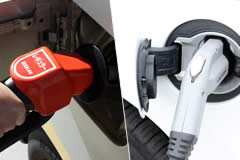Electric Versus Gasoline Powered Vehicles - Vol.284
Every year we hear about electric cars more and more, and understandably so. With the rising cost of gasoline, and environmental concerns among others, it is not surprising that people would want more energy efficient vehicles. So now that automobile manufacturers have started producing these types of vehicles, how do they compare to their gas powered counterparts?
To answer this question you must first understand how they work, there advantages and disadvantages then you can see how the compare.

Gas Powered Vehicles
Gas powered vehicles have been the standard for over 60 years, they are powered by an internal combustion engine which use a mixture of air and fuel ignited by a spark to create energy to turn the engine thus powering the vehicle. Technology, engine design, and materials used have changed considerably since the first automobile rolled of the line making modern engines more efficient.
The Upside
- The Infrastructure Exists: Gas stations are everywhere, as well as stores carrying everything necessary to keep your vehicle running and shops to repair or replace parts.
- Fuel Tank Capacity: The amount of fuel a gas powered vehicle can hold enables them to travel great distances on a single tank before needing to refuel.
- Cheaper Sticker Price: Gas powered vehicles are typically cheaper to buy than an electric vehicle of comparable size and style.
The Downside
- Wasted Energy: Despite all the advance in modern engine design, unfortunately a large percentage of the energy created is lost in the form of heat and exhaust.
- Annual Maintenance Cost: Between fuel, oil changes, tires and various other components the yearly cost to maintain a gas powered vehicle can be quite high.
- Environmentally Unfriendly: Gas powered vehicles produce a greater amount of pollution than electric vehicles and continue to use up a natural resource that cannot be replenished.
Electric Powered Vehicles
People have toyed with the idea of electric cars over the years, but in the past 10 years or so major development has gone into this technology, and electric cars have gone into production. Electric powered vehicles do not contain an internal combustion engine. They use an electric motor or motors powered by a number of batteries known as a battery pack to supply power to the wheels thus propelling the vehicle. These batteries are typically lithium ion batteries, which are generally more efficient than lead acid batteries.
The Upside
- Low Operating Cost: Electric vehicle has very low maintenance cost annually, use no fuel, and utilize 80% or more of the energy they produce so very little is wasted.
- Great City Car: For those who live and work in the city, electric powered cars thrive. They are not affected by the stop and go, and varying speeds like gas powered vehicles are. This is also well within their range from a full charge, typically 70-100 miles.
- Environmentally Friendly: Electric vehicles produce burn no fuel, there for they produce no harmful exhaust, and have considerably less detrimental impact on the environment.
- Less Noise, Great Acceleration: These vehicles are virtually silent, The electric engine produces little or no noise, on top of that when you accelerate the power is there and has no lag like gas engines sometimes do.
The Downside
- Lack Of Infrastructure: Electric vehicles have to be plugged in to recharge, unfortunately the infrastructure to support this does not exist, or where it does it is limited. This is especially problematic for people living in apartment complexes or a college campus, the lack of a garage or distance of parking can make it hard if not impossible to plug in.
- Limited Range: The range of these vehicles is about 70-100 miles, combined with the lack of infrastructure makes the vehicles incapable of long trips.
- Battery Packs: The battery pack will eventually need to be replaced, and this can cost thousands of dollars. Though the battery packs will last for a few years and it's a lot of money to shell out at once, it's typically cheaper than one year of maintenance and upkeep on a gas powered vehicle.
- Innovations will continue on both electric and gas powered vehicles, and in time they may be as many electric cars on the road as gas powered.